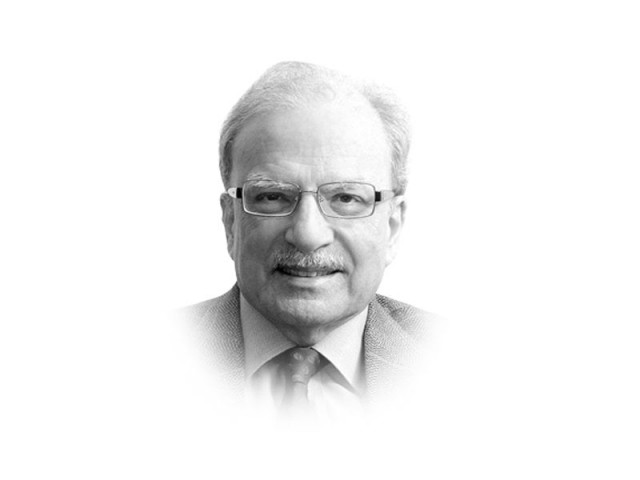An existential moment for Afghanistan
In other words, what happens in Afghanistan matters a great deal for Pakistan

The writer is a former caretaker finance minister and served as vice-president at the World Bank
The elections were preceded by a great deal of violence. The daily toll climbed to a hundred deaths a day, including of 10 candidates for the assembly. The Taliban issued a statement denouncing the elections as “a conspiracy to deceive the people” and “benefit malicious foreign interests.” It said all fighters have been instructed to create “severe obstacles” to voting, while minimising harm to civilians.
But election-related violence was not the only problem the authorities faced. Another worry was the potential for massive fraud of the type that seriously compromised the presidential poll of 2014. Large numbers of false or extra ID cards were reportedly distributed and a costly last effort to install biometric technology at polling stations did not succeed in preventing problems. Pamela Constable, who now lives in Kabul and writes for The Washington Post, said in a dispatch that “despite the risks and flaws, many voters seem genuinely enthusiastic about the chance to elect new, more honest representatives to legislative positions that have been increasingly dismissed as profitable sinecures for aging warlords and corrupt politicians.” The country’s young were the most enthusiastic about the poll and were hopeful that real political and social change would follow.
One thing is clear from the country’s political experience over the last 17 years when Western powers imposed a political system on the country for which it was not ready. This was done in the so-called Bonn agreement in late 2001 after the United States working with the Tajik-dominated Northern Alliance had deposed the Taliban government in Kabul. The decision by Washington to use a Tajik group to overthrow a Pakhtun government was the first of many mistakes the Americans have made in their 17-year-old involvement in Afghanistan. That government had been in power for five years led by the reclusive one-eyed Mullah Omar. The Taliban government had ruled with an iron hand. They tolerated no dissent and resorted to public beheadings or stoning of those who dared to oppose it. They were against all forms of modernisation, especially female education.
Afghanistan in late 2001 was not ready to adopt the political system the Bonn agreement gave the country. Its two main features — a system based on repeated elections at defined intervals and a central government with full authority over the country’s disparate parts — had little to do with Afghan history or tribal practices. Since the agreement was signed in Bonn, the then German capital, five elections have been held at a total cost of $1 billion. The cost was met by foreign donors. Not one of the elections produced results that were accepted by the contestants. The last election for the presidency was held in 2014 that eventually led to the sharing of power between President Ashraf Ghani, a Pakhtun, and Chief Executive Abdullah Abdullah, a Tajik. The agreement was brokered by then United States secretary of state John Kerry.
Afghanistan is now in the grip of the same demographic revolution that has hit most countries of the Muslim world. This is the rise of the youth who now make up more than one-half of the populations of these nations. Powered by social media, the young are working on bringing change in their socially primitive societies. It was that force that put Imran Khan, the Pakistani youth’s cricket hero, in power in Islamabad. Where elections have been accepted as instruments of political and social change, transformation can be relatively peaceful. This was the case in Pakistan. If that valve is not available for resentment to find release, as is the case in the tribal societies of most Arab countries, we can expect a great deal of violence. This has happened in most Arab nations, most notably in Syria. In some cases where non-democratic ways are used to acquire power, even the young use old ways to bring about change. The latest example of this is the Kingdom of Saudi Arabia.
For Pakistan, Afghanistan is not just one more country on the other side of the border. The fates of the two countries are intertwined. To begin with Pakistan has several ethnic groups that spill over into the territories of neighbours. There are Balochis in both Pakistan and Iran. There are many more Urdu-speaking people in India than in Pakistan. There are now small communities of Uighurs in Pakistan’s northern areas after Xinjiang, a Chinese region, came under the control of the Communists. But it is sharing of the Pakhtun population of some 40 to 45 million that tie together Afghanistan and Pakistan. About 16 million of these are in Afghanistan and another 25 million are in Pakistan. Of those in Pakistan, two to four million have moved in as refugees from Afghanistan. Much of the extremism that has gained strength in Pakistan is reportedly centered in the Pakhtun community.
The United States’ involvement in Afghanistan began in 1980 when Washington joined hands with Islamabad and Riyadh to force the invading Soviet Union out of Afghanistan. It picked up steam with the 9/11 terrorist attack on the United States by a group based in Afghanistan. This led to the December 2001 conquest of Afghanistan by the United States. Having tried the use of force to bring peace to Afghanistan but not succeeding, Washington has come to the conclusion that the Taliban must be brought to the negotiating table. For this approach to work, the United States needs Pakistan. In other words, what happens in Afghanistan matters a great deal for Pakistan.
Published in The Express Tribune, October 22nd, 2018.
Like Opinion & Editorial on Facebook, follow @ETOpEd on Twitter to receive all updates on all our daily pieces.















COMMENTS
Comments are moderated and generally will be posted if they are on-topic and not abusive.
For more information, please see our Comments FAQ